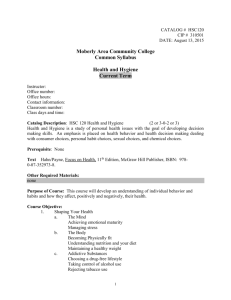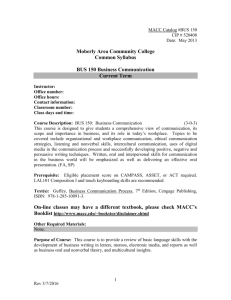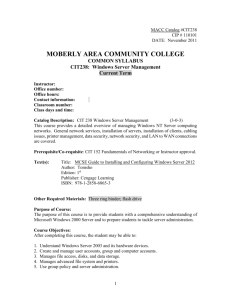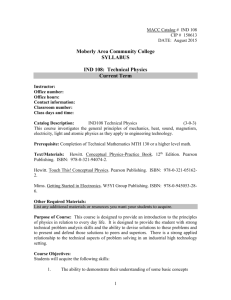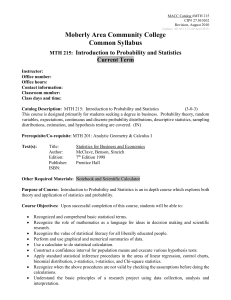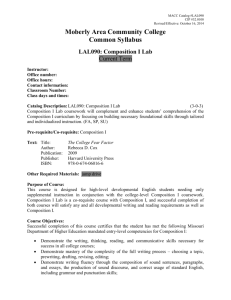MTH 140 College Algebra - Moberly Area Community College
advertisement
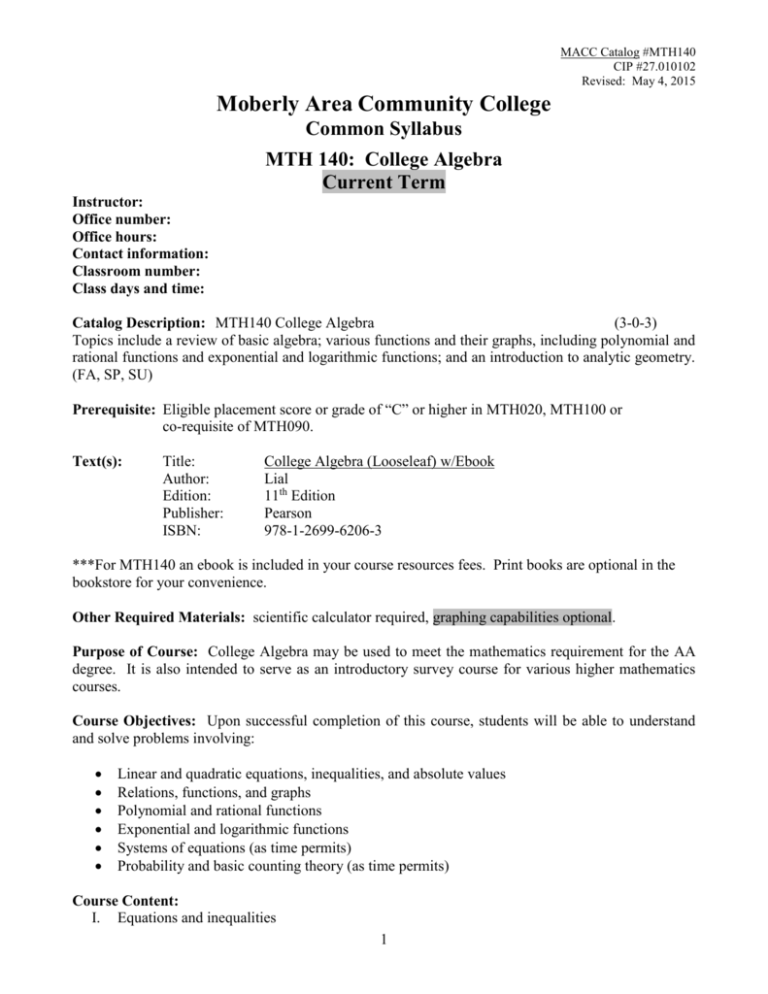
MACC Catalog #MTH140 CIP #27.010102 Revised: May 4, 2015 Moberly Area Community College Common Syllabus MTH 140: College Algebra Current Term Instructor: Office number: Office hours: Contact information: Classroom number: Class days and time: Catalog Description: MTH140 College Algebra (3-0-3) Topics include a review of basic algebra; various functions and their graphs, including polynomial and rational functions and exponential and logarithmic functions; and an introduction to analytic geometry. (FA, SP, SU) Prerequisite: Eligible placement score or grade of “C” or higher in MTH020, MTH100 or co-requisite of MTH090. Text(s): Title: Author: Edition: Publisher: ISBN: College Algebra (Looseleaf) w/Ebook Lial 11th Edition Pearson 978-1-2699-6206-3 ***For MTH140 an ebook is included in your course resources fees. Print books are optional in the bookstore for your convenience. Other Required Materials: scientific calculator required, graphing capabilities optional. Purpose of Course: College Algebra may be used to meet the mathematics requirement for the AA degree. It is also intended to serve as an introductory survey course for various higher mathematics courses. Course Objectives: Upon successful completion of this course, students will be able to understand and solve problems involving: Linear and quadratic equations, inequalities, and absolute values Relations, functions, and graphs Polynomial and rational functions Exponential and logarithmic functions Systems of equations (as time permits) Probability and basic counting theory (as time permits) Course Content: I. Equations and inequalities 1 MACC Catalog #MTH140 CIP #27.010102 Revised: May 4, 2015 II. III. IV. V. VI. Relations, functions, and graphs Polynomial and rational functions Exponential and logarithmic functions Systems of equations and inequalities (as time permits) Probability and basic counting theory (as time permits) Assessment of Student Learning: Emphasis will be on NCTM math standards for course content, especially estimation, problem-solving, and communication. Grades will be calculated on a total point system where 60% mastery will be necessary for completion of the course, however student who wish to transfer or who are enrolled in special programs may have a minimum of 70% mastery required. Please check with your transfer institution or program director. Points may be accumulated through the following: group problems and problem solving, handouts, quizzes, homework, tests, and a problem-solving project or participation in the One Read Project. Tests and the final should comprise 80% of the total grade and instructors are encouraged to use multiple formats for distribution of the remaining percentage. Description of Major Assignment(s)/Project(s): per instructor’s policy Possible options: -participation in the One Read Project -problem solving project with a written component as assigned by instructor. Statement to Connect Course with General Education Outcomes or Technical Program Outcome Statement: In compliance with MACC’s General Education outcomes, the student who successfully completes this course will be able to: Demonstrate an understanding of scientific principles and computational skills and how to use them to solve problems and make informed decisions. Instructor Policies: Academic Dishonesty: MACC board policy is as follows: “Academic dishonesty by students damages institutional credibility and unfairly jeopardizes honest students; therefore, it will not be tolerated in any form.” Forms of academic dishonesty include but are not limited to the following: violations of copyright law, plagiarism, fabrication, cheating, collusion, and other academic misconduct. Incidents of dishonesty regarding assignments, examinations, classroom/laboratory activities, and/or the submission of misleading or false information to the College will be treated seriously. The procedure for handling academic dishonesty is outlined in the Student Handbook (Policy Handbook M.010). In cases of alleged academic dishonesty, the burden of proof is on the student, not on the instructor. Attendance Policy: Any student who misses two consecutive weeks of class during a regular sixteenweek semester or the equivalent proportion of class time during a shorter session will be dropped from the class by the instructor unless acceptable justification is supplied. An instructor must complete and file the appropriate forms to drop the student within one week following the student’s violation of the attendance policy. Additionally, any student who misses more than one-fourth of the entire number of in-seat class meetings in a regular 16-week semester or the equivalent proportion of class time during a 2 MACC Catalog #MTH140 CIP #27.010102 Revised: May 4, 2015 shorter session, may be dropped from that class by the instructor if, in the opinion of the instructor, the student does not have reasonable opportunity to succeed in the class. A student’s attendance rate will be calculated based upon the first day of the semester (not the student’s date of enrollment in the course.) Student attendance must be defined in a different manner for online, hybrid, and virtual courses. Student attendance in these courses is defined as active participation in the course. Online, hybrid, and virtual courses will, at a minimum, have weekly mechanisms for student participation, such as any or all of the following methods: a. Completion of quizzes or exams b. Submission of assignments c. Participation in threaded discussions d. Communication with the instructor A student who does not participate in an online, hybrid, or virtual course for two consecutive weeks will be dropped by the instructor unless acceptable justification is supplied. An instructor must complete and file the appropriate forms to drop the student within one week following the student’s violation of the attendance policy. As with ground courses, a student’s attendance rate in online courses will also be calculated based upon the first day of the semester. If a student does not demonstrate active participation in the online course within the first two weeks (or the equivalent proportion of class time during a short session), the student will be dropped as “never attended.” Simply logging into an online class does not constitute active participation. Students should be aware that their dropping a course and their last date of attendance in the course may impact their financial aid. (Policy Handbook I.090 and M.095) Tardiness: Per instructor’s policy Make-up and late work: Per instructor’s policy Extra-credit work: Per instructor’s policy Schedule of Student Assignments/Activities: Instructors will identify a Student Assignment/Activities schedule. Instructors have the prerogative to construct the schedule by class periods, weeks, or an overview of topics to be covered. ADA Statement Students who have disabilities that qualify under the Americans with Disabilities Act may register for assistance through the Office of Access and ADA Services. Students are invited to contact the Access Office to confidentially discuss disability information, academic accommodations, appropriate documentation and procedures. For more information, please call either the Moberly office at (660) 263-4100 x 11240 or the Columbia office at (573) 234-1067 x 12120, or visit our web page at http://www.macc.edu/index.php/services/access-office. 3 MACC Catalog #MTH140 CIP #27.010102 Revised: May 4, 2015 Title IX Statement MACC maintains a strict policy prohibiting sexual misconduct in any form, including sexual harassment, sexual discrimination, and sexual violence. All MACC employees, including faculty members, are considered mandated reporters of sexual misconduct and as such are expected to contact the Title IX Coordinator when they become aware, in conversation or in writing, of an incident of sexual misconduct. For more information on this policy or to learn about support resources, please see http://www.macc.edu/sexual-misconduct-policy or contact Dr. Jackie Fischer, MACC’s Title IX Coordinator, at 660-263-4110, ext. 11236 or jackief@macc.edu. 4


